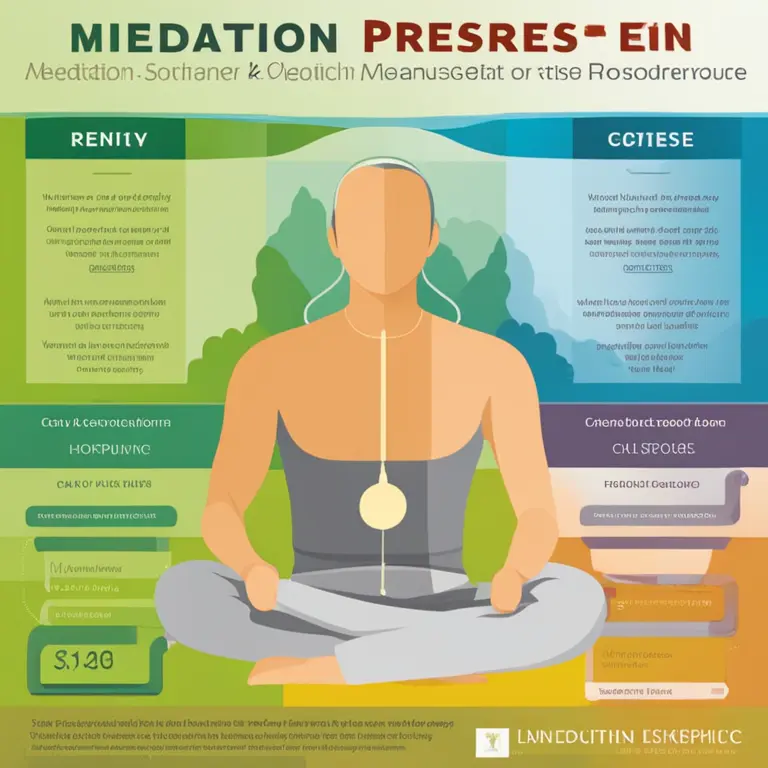
Meditation's Effect on Blood Pressure: A Calm Approach
Delve into the serene world of meditation and discover its potential impact on reducing blood pressure in our latest wellness article.
article by Hina Kurosawa
The Connection Between Mind and Body
The intricate link between the mind and the body has been at the crux of health discussions for centuries. In our fast-paced modern world, where stress is often a constant companion, the quest for tranquility becomes imperative. Meditation offers a refuge, promising not just peace of mind but also tangible physical health benefits. Among these, the potential for meditation to lower blood pressure has piqued the interest of both practitioners and medical professionals alike. It's becoming increasingly clear that mental serenity can catalyze physical well-being.

The Science Behind Meditation and Blood Pressure
Current medical research suggests that meditation can have a positive effect on blood pressure levels. The practice is believed to elicit the body's relaxation response, which in turn can reduce stress hormone levels and promote vasodilation – the widening of blood vessels that eases blood flow and lowers pressure. Specifically, techniques such as mindfulness and transcendental meditation have been the subject of studies that demonstrate a decrease in systolic and diastolic blood pressure, presenting a boon for those battling hypertension.

Different Meditation Techniques Explored
Exploring the landscape of meditation reveals a variety of techniques, each with its own approach to fostering relaxation and mindfulness. Guided imagery, zen, and yoga-based practices each offer unique paths to stress reduction and blood pressure management. Consistency in practice is key, as the compounding effect over time appears to be where the most significant health benefits are realized. Customizing the type of meditation to an individual's personality and lifestyle is crucial in maintaining a regular practice.

Integrating Meditation into Daily Life
In order to reap the heart-healthy rewards of meditation, we need to weave it into the fabric of our daily lives. This doesn't mean setting aside large swaths of time; even short bursts of meditation have shown to be beneficial. The goal is to cultivate an ongoing practice that, when performed regularly, will contribute to sustained blood pressure reduction. Whether it's a morning session to start the day grounded or a brief pause to reset during a hectic afternoon, consistency remains pivotal.

Challenges and Considerations
While meditation has many advocates, it's important to acknowledge that it may not be a silver bullet for everyone. Individual responses to meditation vary, and some may find it takes time to experience the benefits, particularly in the context of cardiovascular health. Moreover, for those with severe hypertension, meditation should complement, not replace, prescribed medications and lifestyle modifications. Consulting with a healthcare provider is always recommended when embarking on any new wellness strategy.
Future Directions in Research
Research into meditation and its effects on blood pressure is ongoing and evolving. As of 2024, the scientific community is delving deeper into understanding the mechanisms behind the relaxation response and its long-term implications for heart health. Mapping the genomics of meditation responders versus non-responders, incorporating wearables to track physiological changes, and broadening demographic studies are all on the horizon, promising to shed new light on this age-old practice.
Personal Journeys and Testimonials
Personal accounts of reduced blood pressure and improved well-being add a relatable dimension to meditation's potential. These narratives not only inspire but provide real-world confirmation of what the research is beginning to show. By sharing these experiences, individuals can contribute to the collective knowledge and provide encouragement for those starting their own journey toward better health through meditation.
Published: 1/15/2024
Modified: 1/15/2024
More predictions
Come back here soon to learn more about yourself and your future


Mindfulness & Meditation: A Guide for High Schoolers
Discover the benefits of mindfulness meditation tailored for the hectic life of high school students, and learn simple strategies to incorporate it into the daily routine.


Easing Loneliness with Meditation
Discover how mindfulness meditation can provide solace and connection to mitigate feelings of loneliness, enhancing emotional and mental well-being.


Mindfulness Meditation Basics for First Graders
Introducing foundational mindfulness meditation practices to instill calm and focus in first-grade students.